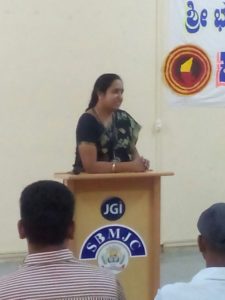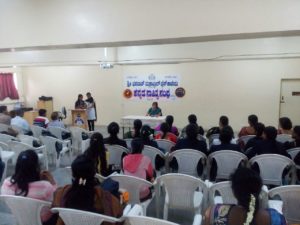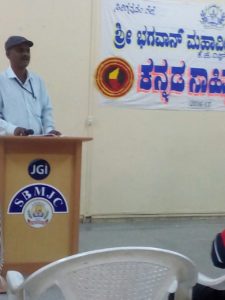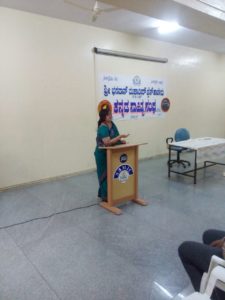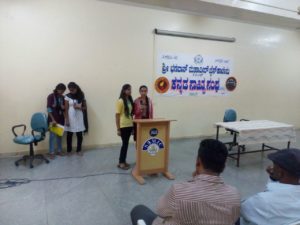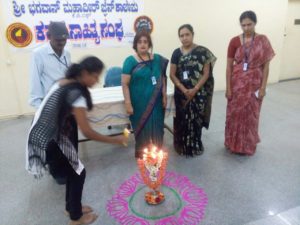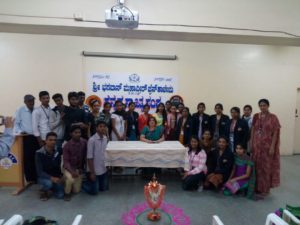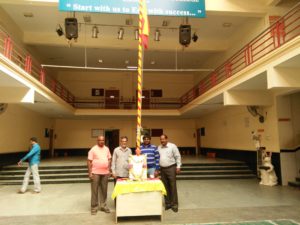
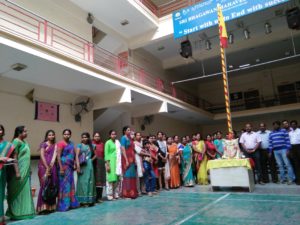
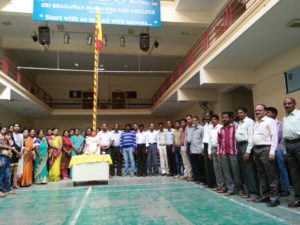
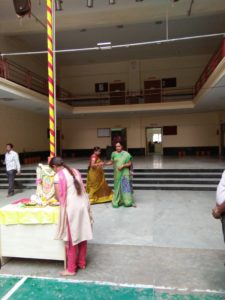
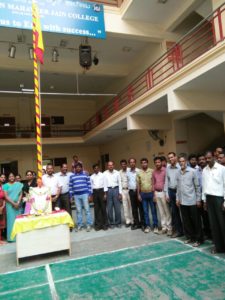

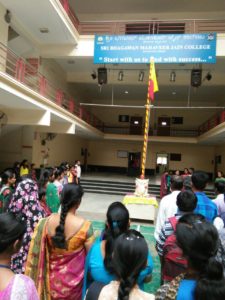

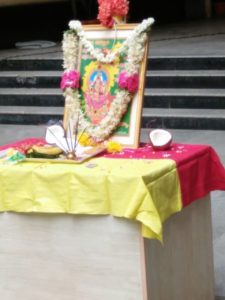
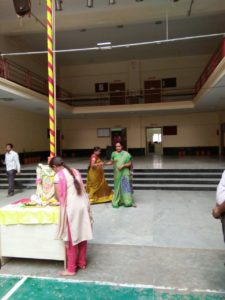
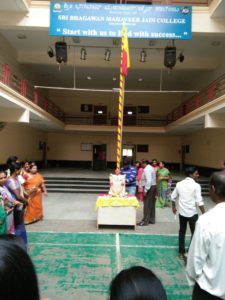
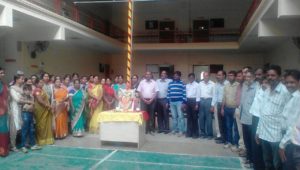

Category: Dept of Kannada
KANNADA HABBA
The Department of Kannada of Sri Bhagawan Mahaveer Jain College, KGF Organised KANNADA HABBA on 28th September 2016 in College Conference Hall. The Chief Guest For Inauguration were Smt. Y. Ramaka (MLA, KGF Constituency), Sri. Golhalli Shiv Prasad (Literature), Sri. Veera Venkatappa (Ex- President of Kannada Sangha, KGF), Mr. Mahendar … Continue reading “KANNADA HABBA”
The Department of Kannada of Sri Bhagawan Mahaveer Jain College, KGF Organised KANNADA HABBA on 28th September 2016 in College Conference Hall.
The Chief Guest For Inauguration were Smt. Y. Ramaka (MLA, KGF Constituency), Sri. Golhalli Shiv Prasad (Literature), Sri. Veera Venkatappa (Ex- President of Kannada Sangha, KGF), Mr. Mahendar kumar Munoth (Managing trustee, SBMJC-KGF) and Dr.Rekha sethi (principal, SBMJC-KGF).
The Event was headed by Dr. Manjulla B K, (The head of the Department). on this occasion different competitions were organised for students to motivate them and help them understand the importance of the Language.














































YAKSHAGANA
The Department of Kannada, SBMJC- KGF organized Yakshagana at College Campus. The Program Was inaugurated by Mr. Mahender Munoth, Dr.Rekha sethi and Sri Karemane Shivananda Hegde. Yakshagana is a folk theater form that combines dance, music, dialogue, costume, make-up, and stage techniques with a unique style and form. The Artistes from Sri Idagunji Mahaganapati Yakshagana … Continue reading “YAKSHAGANA”
The Department of Kannada, SBMJC- KGF organized Yakshagana at College Campus. The Program Was inaugurated by Mr. Mahender Munoth, Dr.Rekha sethi and Sri Karemane Shivananda Hegde.
Yakshagana is a folk theater form that combines dance, music, dialogue, costume, make-up, and stage techniques with a unique style and form.
The Artistes from Sri Idagunji Mahaganapati Yakshagana Mandali, Keremane had performed the Vaali Moksha prasanga from the epic Ramayana.
Idagunji Mahaganapathi Yakshagana Mandali, Keremane Troupe is a Yakshagana troupe based in the Uttara Kannada district of Karnataka, India. It was started by Keremane Shivarama Hegdein the year 1934. He is an exponent of this art form and is the first Yakshagana artist to win the Rashtrapati Award an award handed out by the President of India to people who excel in various fields. Sri Karemane Shivananda Hegde is the present Director of this troupe.





























Singing Competition organised by Kannada Department
The department of Kannada conducted singing comepitaion on 3rd August 2016. OBJECTIVES 1. To Identitifiy the singing skill 2. To Eliminate stage fear SINGING COMPETITION RESULT I Place: MANOJ. N – III BCA II Place: BRUNDA B. A – III BCOM III Place: JABEZ ROBIAN K – II BCOM
The department of Kannada conducted singing comepitaion on 3rd August 2016.
OBJECTIVES
1. To Identitifiy the singing skill
2. To Eliminate stage fear
SINGING COMPETITION RESULT
I Place: MANOJ. N – III BCA
II Place: BRUNDA B. A – III BCOM
III Place: JABEZ ROBIAN K – II BCOM






KANNADA SAHITYA SANGHA Inauguration 2016
KANNADA also known as Canarese or Kanarese is a Dravidian language spoken predominantly by Kannada people in South India, mainly in the state of Karnataka, and by linguistic minorities in the states of Andhra Pradesh, Telangana, Tamil Nadu, Maharashtra, Kerala, and Goa. The language has roughly 40 million native speakers. who are called Kannadigas (Kannaḍigaru), and a total of 50.8 million speakers according to a 2001 census. It is one of the scheduled languages … Continue reading “KANNADA SAHITYA SANGHA Inauguration 2016”
KANNADA also known as Canarese or Kanarese is a Dravidian language spoken predominantly by Kannada people in South India, mainly in the state of Karnataka, and by linguistic minorities in the states of Andhra Pradesh, Telangana, Tamil Nadu, Maharashtra, Kerala, and Goa. The language has roughly 40 million native speakers. who are called Kannadigas (Kannaḍigaru), and a total of 50.8 million speakers according to a 2001 census. It is one of the scheduled languages of India and the official and administrative language of the state of Karnataka.
The Kannada language is written using the Kannada script, which evolved from the 5th-century Kadamba script. Kannada is attested epigraphically for about one and a half millennium, and literary Old Kannada flourished in the 6th-century Ganga dynasty and during the 9th-century Rashtrakuta Dynasty. Kannada has an unbroken literary history of over a thousand years.
Based on the recommendations of the Committee of Linguistic Experts, appointed by the ministry of culture, the government of India designated Kannada a classical language of India. In July 2011, a centre for the study of classical Kannada was established as part of the Central Institute of Indian Languages at Mysore to facilitate research related to the language.
The Aim of Kannada Sahitya Sangha is to:
- To develop ideas to promote unity and co-operation among Kannada speakers spread across different regions.
- To develop suggestions for a common written Kannada which had diversified across different regions
- To ensure that students learning Kannada language use a common textbook
- To improve the general knowledge among the Kannada speaking population by publishing appropriate books.
- To produce appropriate Kannada translations for words used in other languages, especially the scientific words.
